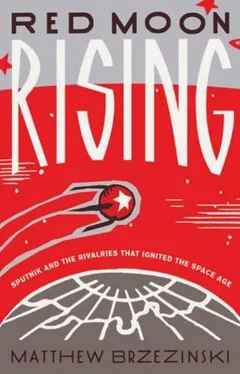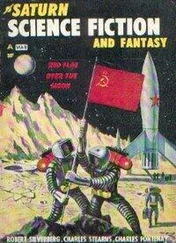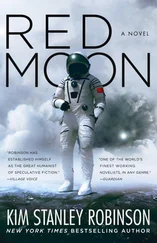Sixty-three seconds into its flight, the rocket ceased being a rocket. At an altitude of seventeen miles, the turbine shut down, cutting off fuel to the combustion chamber. Now the rocket was a projectile, a forty-six-foot-long artillery shell painted in a jagged camouflage scheme of signal white, earth gray, and olive green. Although no longer under power, the rocket still rose, moving at 3,500 miles per hour. The laws of physics that had gotten it this far would see it through the final leg of the journey. It broke the twenty-mile and then the thirty-mile barrier, and continued to climb. Another ten seconds passed, and the rocket reached its apogee of fifty-two miles. It was now brushing against the void of outer space.
Slowly, imperceptibly at first, its tail began to dip. It still hurtled forward at nearly five times the speed of sound, but it was now losing altitude and velocity, and its stabilizer fins had no grip as it tumbled backward toward earth. The tug-of-war between the forces of momentum and gravity had begun.
The time was 6:41 PM, a Friday. In London, fifty miles below and eighty miles to the west, the evening rush hour was just waning. Traffic was not heavy, owing to gasoline rationing, and the city was settling down to supper. Lights flickered from apartment windows and homes; the blackouts that had been in effect during the air raids were no longer rigorously enforced now that the Royal Air Force had repelled the Luftwaffe and claimed control of the skies. In central London, an American radio reporter by the name of Edward R. Murrow prepared his evening broadcast. In Chiswick, in the western suburbs, six-year-old John Clarke was freshening up for dinner in the upstairs bathroom of his family’s brick town house. His three-year-old sister, Rosemary Ann, was playing in her bedroom down the hall. Both children were in good spirits. After all, there was no school tomorrow.
Over the North Sea, the rocket was now in freefall, plunging tailfirst at a rate of 3,400 feet per second. As it descended into the thicker atmosphere, its fins began regaining traction and slowly the rocket righted itself. The aerodynamic friction that permitted its stabilizers to regain their function now began to wreak havoc on its rapidly heating shell. The nose cone glowed faintly as the temperature of the quarterinch-thick sheet metal that encased it rose to 1,100 degrees. The frictional drag increased as the rocket descended into the lower, denser atmosphere and approached the British coastline. It shot over Ipswich and Southend-on-Sea, pivoting slightly, so that the jagged edges of its camouflage pattern twirled in a grayish-green blur. Other than its protective paintwork, and a seven-digit serial number, the rocket bore no identifying markings. To its creator, the brilliant engineering prodigy Wernher von Braun, it was known as the A-4. To the Nazi High Command it was the Vergeltungswaffen-2, the new Vengeance Weapon that would restore the balance of power in the air campaign. The British would come to know it as the V-2, the world’s first ballistic missile.
Now in the final moments of its four-minute flight, the V-2’s target area sprawled out beneath it in every direction. The rocket was blind. Its navigation system had stopped working at the seventeenth-mile point of its journey, where it had been hurled on a predetermined trajectory. But the V-2 was an imprecise aiming device; where exactly within a ten-mile radius the missile would land was a matter of geographic chance. The East End, the City, and the Tower of London whirled past. The western part of the British capital magnified into view. The rocket’s target range grew narrower. A neighborhood, Chiswick, now loomed ahead. Its red-tile roofs and cobblestone streets approached at three times the speed of sound. But no one heard the V-2 coming. Its sonic boom, that shrill thundering crack that sounded like a nearby lightning strike, hadn’t caught up to it yet.
Silently, the V-2 slammed into Staveley Road at Mach 3, gouging a crater thirty feet long and eight feet deep. A millisecond after impact, its 1,627 pounds of high explosives, a pink, puffy mixture of ammonium nitrate and Amatol, detonated.
The explosion and ensuing sonic boom deafened John Clarke. His parents’ house, and the homes of six of their neighbors, crumbled around him. The bedroom walls parted and fell away. Floors imploded in heaps of dust and plaster. Bricks and wood splinters crashed through windows like shrapnel. Furniture flew. Ceilings collapsed. Hallways caved in. And all this occurred in an eerily noiseless vacuum. “The best way to describe it is television with the sound off,” Clarke told the BBC sixty years later.
When the mushroom cloud over Staveley Road dissipated, Clarke saw that the bedroom where his sister had been playing stood intact. Miraculously, his sister also seemed unharmed. “There wasn’t a mark on Rosemary,” he recalled. He shook her, but she didn’t respond. The blast wave had collapsed her little lungs. She had died where she sat.
Two minutes later, another V-2 struck North London, killing six more people. That night, Edward R. Murrow informed his American listeners of a new German weapon that rained “death from the stratosphere.”
“German science,” he predicted in a subsequent broadcast in November, after 168 people perished when a Woolworth department store suffered a direct V-2 hit, “has once again demonstrated a malignant ingenuity which is not likely to be forgotten when it comes time to establish control over German scientific and industrial research.”
• • •
The war was over—at least in the technology corridor of Adlershof, just outside Berlin. Marshal Georgy Zhukov’s tanks and the First Ukrainian Red Army Group had rolled through the industrial suburb several days earlier, on April 26, 1945, and the fighting had been brief. Artillery still echoed from the not-too-distant German capital, where the Führer had gone to ground in his bunker under the Reich Chancellery, but in Adlershof residents were already clearing debris from streets, filling in the bomb craters along Rudower Chausse, and carting away glass from shattered storefronts. There was a sense of relief and resignation throughout the town, as if its inhabitants had already made peace with a new era and master.
Boris Chertok had no trouble finding the big brown brick building. It was exactly where Soviet military intelligence said it would be. Downshifting his commandeered gray Mercedes, Chertok pulled up to the entrance. The main gate had been ripped off its hinges, and a body lay slumped near a twisted bicycle stand. But otherwise the research center seemed undamaged. Cautiously, Chertok made his way inside. He was nervous. Berlin’s new masters were still jumpy, unnerved by the perplexing sight of ordinary Germans calmly tending their lawns and rose gardens as Soviet T-34 tanks clattered past their homes to blast the Reichstag.
Unholstering his pistol, Chertok stepped into the darkened complex. Everything was intact: equipment, safes, precision tools, files with test results, and all manner of documents and blueprints, many stamped SECRET or TOP SECRET. Even the keys to the gleaming white laboratories had been left behind—obligingly numbered, in neat orderly rows. Chertok stowed the gun. He barely knew how to use it anyway. The sidearm, like his ill-fitting uniform, was a new and uncomfortable acquisition, a recent addition to his wardrobe that left him feeling like an imposter. The bars and gold star on his shoulder boards identified him as a major in the Red Army, but the military garb would not have fooled a seasoned veteran. The tunic was too clean, the boots too unscuffed for a frontline officer. What’s more, not a single combat decoration hung from Chertok’s breast, a highly suspect omission after four years of all-out war. Major Chertok, it was clear, was only masquerading as a soldier. In reality he was a thirty-three-year-old electrical engineer with a prematurely receding hairline, the slight paunch of someone who spends too much time behind a desk, and a dossier identifying him as an employee of NII-1, the Soviet Union’s leading rocket research agency. Hundreds of civilian specialists just like him were pouring into Germany, arriving daily in a motley assortment of Dodges, Studebakers, and converted Boston B-25 bombers that the United States had given the Soviet Union under the lend-lease program. And they were coming—as Edward R. Murrow had prophesied—to claim the intellectual spoils of war, to seize upon Nazi Germany’s “malignant ingenuity.”
Читать дальше












